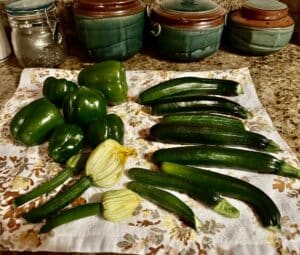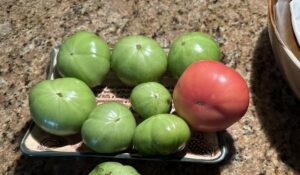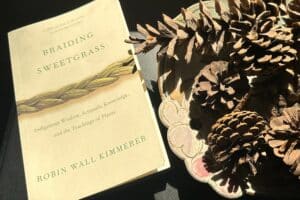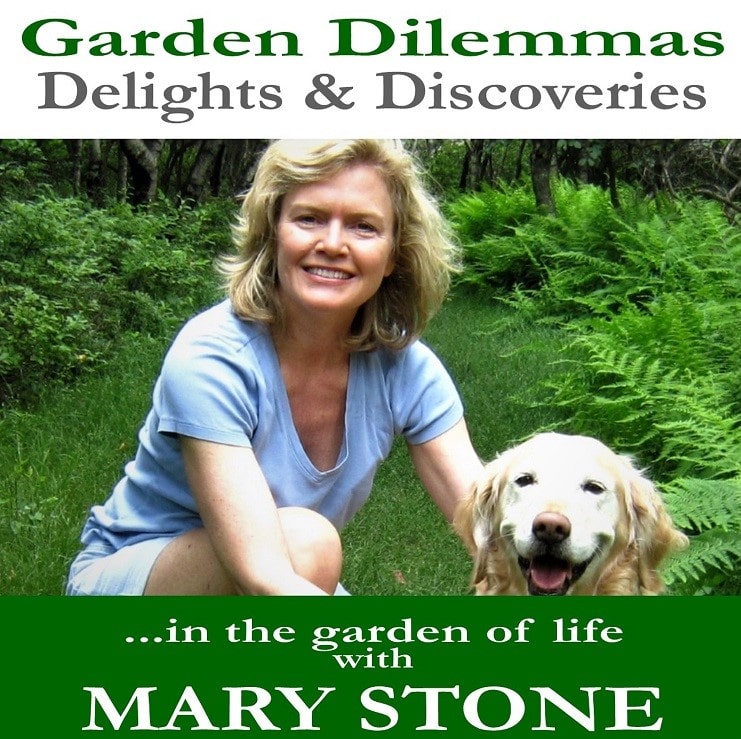Hello, fellow lovers of all things green,
Our warm weather anomaly quickly turned into the first hard frost, inspiring the last of the fall harvest. An honorable harvest. A grateful harvest of the gifts from the garden of life.

I am grateful for the gift of my November 6th harvest.
Having had only one zucchini this growing season, despite two planting cycles, I hoped the baby zucchini that sprouted during the drought would mature enough to eat. Same with the green tomatoes. Each day, I’d check to see if there was a color shift. When tomatoes turn lighter and have a gel-like substance inside, two growth hormones change and cause the production of ethylene gas, which ages the cells, resulting in ripening. Then you can ripen them indoors.
What a delight to pick the baby zucchinis a week ago, each about six inches long and an inch wide. A few smaller ones still had blossoms on the fruit. They were delicious. I also picked a half-dozen green peppers. Plus, a few tomatoes made the color shift. One is ripening ever so slowly; it’s such fun to watch. As I picked the last vegetables, I thanked them for the bounty.
Sharing the Bounty with Wildlife
I removed the netting around the vegetable garden, and the deer have enjoyed their harvest. Sharing the bounty during the growing season is a routine, too, by tossing green beans into the yard too mature for my taste or tomatoes pecked by our feathered friends or nibbled by insects.

The last of my Fall Harvest
Native Americans thanked God for the plants and the animals that provided food. Everything was used, and they had a moment of sorrow for the animal that gave its life. They believed in the Honorable Harvest, as Robin Wall Kimmerer, the author of Braiding Sweetgrass, eloquently describes. Dr. Kimmerer, Associate Professor of Environmental and Forest Biology at the State University of New York, combines her heritage as a Potawatomi with her passion for science and the environment.
Sweetgrass, Hierochloe (meaning “holy grass”) odorata (meaning “fragrant”), is native to North America. It is part of Native American rituals and healing. Braiding Sweetgrass is a metaphor for respecting and being grateful for our Earth and the interconnection of all living things.
Guidelines for an Honorable Harvest
Kimmerer lists the guidelines for The Honorable Harvest, though our indigenous peoples did not write or regularly speak of them. She writes:
“—They are reinforced in small acts of daily life. But if you were to list them, they might look something like this: Know the ways of the ones who take care of you so that you may take care of them. Introduce yourself. Be accountable as the one who comes asking for life. Ask permission before taking. Abide by the answer.”

I highly recommend Braiding Sweetgrass by Robin Wall Kimmerer.
Later in the section, I adore how she used the example that, as a child, you’d thank your grandma if she made cookies and offered you a few. And wouldn’t later go into the pantry and take them all without permission.
“Never take the first. Never take the last. Take only what you need. Take only that which is given. Never take more than half. Leave some for others.”
“Harvest is a way that minimizes harm. Use it respectfully. Never waste what you’ve taken. Share. Give thanks for what you have been given. Give a gift in reciprocity for what you have taken.”
“Sustain the ones who sustain you, and the Earth will last forever.”
Powerful words of truth.
Our Dishonorable Harvest
Kimmerer describes that “the dishonorable harvest has become a way of life— we take what doesn’t belong to us and destroy it beyond repair: Onondaga Lake… the rainforests of Malaysia, the list is endless. They are gifts from our sweet Grandmother Earth, which we take without asking. How do we find the Honorable Harvest again?”
Throughout her book, there are sentiments of hope, just as I believe we can exercise the wisdom of our ancestors and nurture the land plants and wildlife to ensure a bounty for generations to come.
There are initiatives for renewable or clean energy— taking advantage of the wind that blows, the sun that shines, the ocean waves, and the Earth’s warmth. But are we doing so without negatively impacting our planet? What about mining minerals to make batteries? And what do we do with the old batteries? Then, there are the dead whales that are washing ashore. The list goes on. We know there are tragedies despite our good intentions. Yet, without answers and solutions, we continue with our heads in the sand. May big business and each one of us find the Honorable Harvest again. It seems overwhelming, but we can start in our backyards.
Thanksgiving is when we give thanks for the gifts of life. Of family and friends, those here, and those who have passed on. We give thanks for the bounty of food and shelter- and love. And for the beauty and lessons of nature. May we learn to give thanks every day. Happy Thanksgiving.
Garden Dilemmas? AskMaryStone@gmail.com and your favorite Podcast App.
There’s more to the story in the Garden Dilemmas Podcast … including a personal story (Downsize and Do-Over) from my book underway (The Lesson of the Leaf) :
Related Podcast Episodes and Blog Posts you’ll enjoy:
Lessons from Braiding Sweetgrass – Blog Post
Ep 165. Lessons from Braiding Sweetgrass
Ep 181. Don’t Be a Fig Pig – Give a Fig
Birds & Bees of Zucchini Flowers – Blog Post



Beautiful article, Mary.
I love the idea of an honorable harvest, but need to know how to get our rats and squirrels on board with it. They have eaten our persimmons, tomatoes and now even the kale – and never thought once of sharing it with the people who planted it. I’ll have to leave them a copy of the book!
Happy Thanksgiving to you! ❤️
Thank you, Debbie,
I hear your pain about critters being greedy. On the East Coast, deer, woodchucks, and rabbits can mow a garden down. Hence, my deer netting is secured with rocks at the base. I wonder if there’s rat and squirrel netting available? Ha!
Jolee must be our squirrel deterrent, as she loves the chase, and we have many of them, but knock on wood; they haven’t interfered noticeably with the veggies.
When I lived in Boonton, NJ, the previous owner’s quail cage was made of chain link; the footing was dug a foot below ground, and it had a roof of chain link, too. It was an ideal garden, keeping all but the birds at bay. However, to imagine the previous owners raising quail to hunt them left a sick pit in my stomach. Maybe time for a new DIY project? Thanks for reading the post. Happy Thanksgiving! Mary